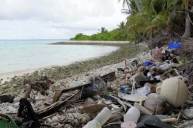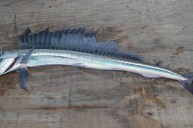An expert is ringing the alarm bells over a proposed start to deep sea mining in international waters, saying that it would be an irreversible disaster to the planet.
The proposed deep-sea mining project could start as early as next year. However, Dr. Sandor Mulsow, a Chilean professor of marine geology, said that the effects on the environment could be felt for generations to come.
"We are very worried about the activities of deep sea mining in the areas beyond national jurisdiction," Mulsow told news.com.au. "As with landmines, it will destroy (the site where you mine) so in this case, the deep sea."
It looks to strip the ocean of deposits such as copper and zinc from the sea bed. No one country owns international waters. It's shared by all sovereign nations. Right now, there are 17 deep-sea mining contracts at play. Deep sea mining, which is still in its experimental stage, is the process of retrieving valuable mineral deposits, such as copper, nickel, zinc and rare earth elements, from the seabed at depths greater than 200 meters.
"People want to only make money ... like the mining company and an investor who thinks there be a huge return on it," Mulsow warned. "(But) it's an unthinkable and unsoundly decision for the whole world."
Deep-sea mining could devastate the ecosystem and destroy biodiversity in the ocean. There's also concerns about releasing CO2 back into the environment.
Deep Sea Mining
"The bottom of the sea is the biggest CO2 sink and it gets stored in the sediment. So if we are going to intervene in the deep sea for deep sea mining, we will destroy this interface between the water and the sediment, which is very old," said Mulsow. "Even if you disturb 10 centimetres or 20 centimetres ... of the sea floor it doesn't seem too much. (But), you are disturbing 10 to 20,000 years old geological record."
Mulsow said small disturbances will be felt for generations.
"We had at least 19 different experiments in parts of the deep sea where scientists have gone with a plough from the land. And specifically disturbed the sediment in small areas, one metre wide. And there has been no recovery whatsoever in 30 years from this tiny disturbance," he said. "Each mine is going to be 3000,000 square kilometres. And take up sediment which is 10-20,000 years old, (so) life will never return."
He also said that the environment is in trouble.
"If are going to destroy the capability of the seawater to support life. Then we are in deep trouble," he said. "(We need) a moratorium for 30 years, not 10 years, in order to properly understand what will happen if we intervene ... this initially needs to be explored."




